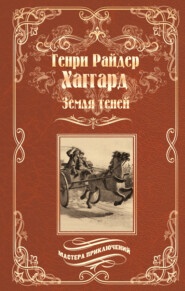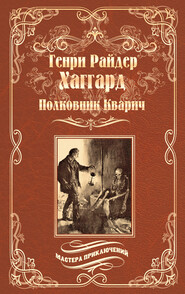По всем вопросам обращайтесь на: info@litportal.ru
(©) 2003-2024.
✖
Joan Haste
Настройки чтения
Размер шрифта
Высота строк
Поля
“Miss Haste – Joan,” he said huskily, “I want to speak to you.”
Joan felt that the hour of trial had come, but still sought a feeble refuge in flippancy.
“You have been doing that for the last five minutes, Mr. Rock,” she said; “and I should like to go home.”
“No, no, not yet – not till you have heard what I have to say.” And he made a quick movement as though to cut off her retreat.
“Well, be quick then,” she answered, in a voice in which vexation and fear struggled for the mastery.
Twice Samuel strove to speak, and twice words failed him, for his agitation was very real. At last they came.
“I love you,” he said, in an intense whisper. “By the God above you, and the dead beneath your feet, I love you, Joan, as you have never been loved before and never will be loved again!”
She threw her head back and looked at him, frightened by his passion. The realities of his declaration were worse than she had anticipated. His thin face was fierce with emotion, his sensitive lips quivered, and the long lithe fingers of his right hand played with his beard as though he were plaiting it. Joan grew seriously alarmed: she had never seen Samuel Rock look like this before.
“I am sorry,” she murmured.
“Don’t be sorry,” he broke in; “why should you be sorry? It is a great thing to be loved as I love you, Joan, a thing that does not often come in the way of a woman, as you will find out before you die. Look here: do you suppose that I have not fought against this? Do you suppose that I wanted to fall into the power of a girl without a sixpence, without even an honest name? I tell you, Joan, I have fought against it and I have prayed against it since you were a chit of sixteen. Chance after chance have I let slip through my fingers for your sake. There was Mrs. Morton yonder, a handsome body as a man need wish for a wife, with six thousand pounds invested and house property into the bargain, who as good as told me that she would marry me, and I gave her the go-by for you. There was the minister’s widow, a lady born, and a holy woman, who would have had me fast enough, and I gave her the go-by for you. I love you, Joan – I tell you that I love you more than land or goods, more than my own soul, more than anything that is. I think of you all day, I dream of you all night. I love you, and I want you, and if I don’t get you then I may as well die for all the world is worth to me.” And he ceased, trembling with passion.
If Joan had been alarmed before, now she was terrified. The man’s earnestness impressed her artistic sense – in a certain rude way there was something fine about it – but it awoke no answer within her heart. His passion repelled her; she had always disliked him, now she loathed him. Swiftly she reviewed the position in her mind, searching a way of escape. She knew well enough that he had not meant to affront her by his references to her poverty and the stain upon her birth – that these truths had broken from him together with that great truth which animated his life; nevertheless, with a woman’s wit putting the rest aside, it was on these unlucky sayings that she pounced in her emergency.
“How, Mr. Rock,” she asked, rising and standing before him, “how can you ask me to marry you, for I suppose that is what you mean, when you throw my poverty – and the rest – in my teeth? I think, Mr. Rock, that you would do well to go back to Mrs. Morton, or the minister’s widow who was born a lady, and to leave me in peace.”
“Oh, don’t be angry with me,” he said, with something like a groan; “you know that I did not mean to offend you. Why should I offend you when I love you so, and want to win you? I wish that I had bitten out my tongue before I said that, but it slipped in with the rest. Will you have me, Joan? Look here: you are the first that ever I said a sweet word to, and that ought to go some way with a woman; and I would make you a good husband. There isn’t much that you shall want for if you marry me, Joan. If any one had told me when I was a youngster that I should live to go begging and craving after a woman in this fashion, I’d have said he lied; but you have put me off, and pushed me aside, and given me the slip, till at length you have worked me up to this, and I can’t live without you – I can’t live without you, that’s the truth.”
“But I am afraid you will have to, Mr. Rock,” said Joan more gently, for the tears which trembled in Samuel’s light blue eyes touched her somewhat; and after all, although he repelled her, it was flattering that any man should value her so highly: “I do not love you.”
His chin dropped upon his breast dejectedly. Presently he looked up and spoke again.
“I did not expect that you would,” he said: “it had been too much luck for a miserable sinner. But be honest with me, Joan – if a woman can – and tell me, do you love anybody else?”
“Not a soul,” she answered, opening her brown eyes wide. “Who is there that I should love here?”
“Ah! that’s it,” he answered, with a sigh of relief: “there is nobody good enough for you in these parts. You are a lady, however you were born, and you want to mate with your own sort. It is no use denying it: I have watched you, and I’ve seen how you look down upon us; and all I’ve got to say is: – Be careful that it does not bring you into trouble. Still, while you don’t love anybody else – and the man you do love had better keep out of my way, curse him! – there is hope for me. Look here, Joan: I don’t want to press you – take time to think it over. I’m in no hurry. I could wait five years if I were sure of getting you at last. I dare say I frightened you by my roughness: I was a fool; I should have remembered that it is all new to you, though it is old enough for me. Listen, Joan: tell me that I may wait awhile and come again – though, whether you tell me or not, I shall wait and I shall come, while there is breath in my body and I can find you out.”
“What’s the use?” said Joan. “I don’t love you, and love does not grow with waiting; and if I do not love you, how can I marry you? We had better make an end of the business once and for all. I am very sorry, but it is not been my fault.”
“What’s the use? Why, all in the world! In time you will come to think differently; in time you will learn that a Christian man’s honest love and all that goes with it isn’t a thing to be chucked away like dirty water; in time, perhaps, your aunt and uncle will teach you reason about it, though you do despise me since you went away for your fine schooling – — ”
“Oh, don’t tell them!” broke in Joan imploringly.
“Why, I have told them. I spoke to your aunt this very day about it, and she wished me God-speed with all her heart, and I am sure she will be vexed enough when she hears the truth.”
As Joan heard these words her face betrayed the perturbation of her mind. Her aunt’s fury when she understood that she, Joan, had rejected Samuel Rock would indeed be hard to bear. Samuel, watching, read her thoughts, and, growing cunning in his despair, was not slow to turn them to his advantage.
“Listen, Joan,” he said: “say that you will take time to think it over, and I will make matters easy for you with Mrs. Gillingwater. I know how to manage her, and I promise that not a rough word shall be said to you. Joan, Joan, it is not much to ask. Tell me that I may come again for my answer in six months. That can’t hurt you, and it will be hope to me.”
She hesitated. A warning sense told her that it would be better to have done with this man at once; but then, if she obeyed it, the one thing which she truly feared – her aunt’s fury – would fall upon her and crush her. If she gave way, on the other hand, she knew well enough that Samuel would shelter her from this storm for his own sake if not for hers. What could it matter, she argued weakly, if she did postpone her final decision for six months? Perhaps before that time she might be able to escape from Bradmouth and Samuel Rock, and thus avoid the necessity of giving any answer.
“If I do as you wish, will you promise not to trouble me, or interfere with me, or to speak to me about this kind of thing in the meanwhile?” she asked.
“Yes; I swear that I will not.”
“Very good: have your own way about it, Mr. Rock; but understand that I do not mean to encourage you by this, and I don’t think it likely that my answer six months hence will be any different from what it is to-day.”
“I understand, Joan.”
“Very well, then: good-bye.” And she held out her hand.
He took it, and, overmastered by a sudden impulse, pressed it to his lips and kissed it twice or thrice.
“Leave go,” she said, wrenching herself free. “Is that the way you keep your promise?”
“I beg your pardon,” he answered humbly. “I could not help it – Heaven knows that I could not help it. I will not break my word again.” And he turned and left her, walking through the grass of the graves with a slow and somewhat feline step.
* * *
At last he was gone, and Joan sat down once more, with a gasp of relief. Her first feelings were those of exultation at being rid of Mr. Rock; but they did not endure. Would he keep his promise, she wondered, and hide from her aunt the fact that he had proposed and been rejected? If he did not, one thing was clear to her – that she would be forced to fly from Bradmouth, since by many a hint she knew well that it was expected of her that she should marry Samuel Rock, who was considered to have honoured her greatly by his attentions. This, in view of their relative social positions in the small society of Bradmouth, was not wonderful; but Joan’s pride revolted at the thought.
“After all this,” she said aloud, “how is he so much higher than I am? and why should my aunt always speak of him as though he were a king and I a beggar girl? My blood is as good as his, and better,” and she glanced at a row of ancient tombstones, whereof the tops were visible above the herbage of rank grass, yellow crowsfoot, and sheep’s-parsley still white with bloom, that marked the resting-places of the Lacons.
These Lacons had been yeoman farmers for many generations, until the last of them, Joan’s grandfather, took to evil courses and dissipated his ancestral patrimony, the greater part of which was now in the possession of Samuel Rock.
Yes, that side of her pedigree was well enough, and were it not for the mystery about her father she could have held her head up with the best of them. Oh, it was a bitter thing that, through no fault of her own, Samuel Rock should be able to reproach her with her lack of an “honest name”! So it was, however – she was an outcast, a waif and a stray, and it was useless to cloak this fact. But, outcast or no, she was mistress of herself, and would not be driven into marriage, however advantageous, with Samuel Rock or any other man who was repellent to her.
Having come to this conclusion, Joan’s spirits rose. After all, she was young and healthy, and, she believed, beautiful, with the wide world before her. There were even advantages in lacking an “honest name,” since it freed her from responsibilities and rendered it impossible for her to disgrace that which she had not got. As it was, she had only herself to please in the world, and within reasonable and decent limits Joan meant to please herself. Most of all did she mean to do so in connection with these matters of the heart. Nobody had ever loved her, and she had never found anybody to love; and yet, as in all true women, love of one sort or another was the great desire and necessity of her life. Therefore on this point she was determined: she would never marry where she could not love.
Thus thought Joan; then, weary of the subject, she dismissed it from her mind for a while, and, lying back upon the grass in idle contentment, watched the little clouds float across the sky till, far out to sea, they melted into the blue of the horizon. It was a perfect afternoon, and she would enjoy what was left of it before she returned to Bradmouth to face Samuel Rock and all her other worries. Grasshoppers chirped in the flowers at her feet, a beautiful butterfly flitted from tombstone to grey tombstone, sunning itself on each, and high over her head flew the jackdaws, taking food to their young in the crumbling tower above.
For a while Joan watched these jackdaws through her half-shut eyes, till suddenly she remembered that her late employer Mr. Biggen’s little boy had confided to her his ardent desire for a young bird of that species, and she began to wonder if she could reach the nest and rob it as a farewell gift to him.
Speculation led to desire, and desire to endeavour. The ruined belfry stairway still ran up the interior of the tower for twenty feet or more – to a spot, indeed, in the stonework where a huge fragment of masonry had fallen bodily, leaving a V-shaped opening that reached to the battlements. Ivy grew upon this gap in the flint rubble, and the nest of the two jackdaws that Joan had been watching particularly, did not appear to be more than a dozen feet above the top of the broken stair. This stair she proceeded to climb without further hesitation. It was not at all safe, but she was active, and her head being good, she reached the point where it was broken away without accident, and, taking her stand on the thickness of the wall, supported herself by the ivy and looked up. There, twice her own height above her, was the window slit with the nest in it, but the mortar and stone upon which she must cling to reach it looked so crumbling and insecure that she did not dare to trust herself to them. So, having finished her inspection, Joan decided to leave those young jackdaws in peace and descend to earth again.
Chapter 3
The Beginnings of Fate
It was at this juncture that Captain Henry Archibald Graves, R.N., pursuing his way by the little-frequented sea road that runs along the top of the cliff past the Ramborough ruins to Bradmouth, halted the cob on which he was riding in order that he might admire the scene at leisure. Presently his eyes, following the line of the ruined tower, lit upon the figure of a girl standing twenty feet from the ground in a gap of the broken wall. He was sixty yards away or more, but there was something so striking and graceful about this figure, poised on high and outlined against the glow of the westering sun, that his curiosity became excited to know whose it was and what the girl might be doing. So strongly was it excited, indeed, that, after a fateful moment of hesitation, Captain Graves, reflecting that he had never examined Ramborough Abbey since he was a boy, turned his horse and rode up the slope of broken ground that intervened between him and the churchyard, where he dismounted and made the bridle fast to a stunted thorn. Possibly the lady might be in difficulty or danger, he explained to himself.
When he had tied up the cob to his satisfaction, he climbed the bank whereon the thorn grew, and reached the dilapidated wall of the churchyard, whence he could again see the lower parts of the tower which had been hidden from his view for a while by the nature of the ground. Now the figure of the woman that had stood there was gone, and a genuine fear seized him lest she should have fallen. With some haste he walked to the foot of the tower, to halt suddenly within five paces of it, for before him stood the object of his search. She had emerged from behind a thicket of briars that grew among the fallen masonry; and, holding her straw hat in her hand, was standing with her back towards him, gazing upwards at the unattainable nest.
“She is safe enough, and I had better move on,” thought Captain Graves.
At that moment Joan seemed to become aware of his presence; at any rate, she wheeled round quickly, and they were face to face.
She started and blushed – perhaps more violently than the occasion warranted, for Joan was not accustomed to meet strange men of his class thus unexpectedly. Captain Graves scarcely noticed either the start or the blush, for, to tell the truth, he was employed in studying the appearance of the loveliest woman that he had ever beheld. Perhaps it was only to him that she seemed lovely, and others might not have rated her so highly; perhaps his senses deceived him, and Joan was not truly beautiful; but, in his judgment, neither before nor after did he see her equal, and he had looked on many women in different quarters of the world.
She was tall, and her figure was rounded without being coarse, or even giving promise of coarseness. Her arms were somewhat long for her height, and set on to the shoulders with a peculiar grace, her hands were rather thin, and delicately shaped, and her appearance conveyed an impression of vigour and perfect health. These gifts, however, are not uncommon among English girls. What, to his mind, seemed uncommon was Joan’s face as it appeared then, in the beginning of her two-and-twentieth year, with its curved lips, its dimpled yet resolute chin, its flawless oval, its arched brows, and the steady, tender eyes of deepest brown that shone beneath them. For the rest, her head was small and covered with ripping chestnut hair gathered into a knot at the back, her loose- bodied white dress, secured about the waist with a leather girdle, was clean and simple, and her bearing had a grace and dignity that Nature alone can give. Lastly, though from various indications he judged that she did not belong to his own station in life, she looked like a person of some refinement.

















